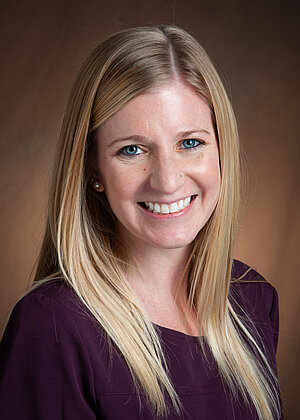Kathryn T. Wissman, Ph.D.

Assistant Professor
Department of Psychology
North Dakota State University
Office: 232B14 Minard Hall
Phone: (701) 231-5149
Email: kathryn.wissman@ndsu.edu
Lab website: SLAC Lab
Research Interests:
My broad program of research focuses on how to enhance student success. In general, I investigate what learning techniques facilitate long-term maintenance of knowledge and why particular learning techniques help students remember information over extended periods of time. One area of my research focuses on test-enhanced learning, showing that taking tests is not just a way to measure learning but also a technique that students can use to enhance learning. Another area of research focuses on collaborative learning, evaluating how memory is affected when students work together in a group environment.
Education:
Ph.D., 2016, Psychology, Kent State University
B.A., 2009, Psychology (Summa Cum Laude), Kent State University
Academic Appointments:
2018-present, Assistant Professor, Department of Psychology, North Dakota State University
2016-2018, Postdoctoral Fellow, Department of Psychology, Skidmore College
Courses Taught:
PSYC 111: Introduction to Psychology
UNIV 150: Foundations of Science
Selected Publications:
Peterson, D. J., & Wissman, K. T. (2018). The testing effect and analogical problem solving, Memory, 26, 140-1466. https://doi.org/10.1080/09658211.2018.1491603
Wissman, K. T., & Peterson, D. J. (2018). Investigating the replicability and generalizability of the negative testing effect, Journal of Applied Research in Memory and Cognition, 7, 352-360. https://doi.org/10.1016/j.jarmac.2018.05.002
Wissman, K. T., Zamary, A., & Rawson, K. A. (2018). When does practice testing promote transfer on deductive reasoning tasks? Journal of Applied Research in Memory and Cognition, 7, 398-411. https://doi.org/10.1016/j.jarmac.2018.03.002
Mulligan, N. W., Rawson, K. A., Peterson, D. P., & Wissman, K. T. (2018). The replicability of the negative testing effect: Differences across participant populations, Journal of Experimental Psychology: Learning, Memory, and Cognition, 44, 752-763. http://dx.doi.org/10.1037/xlm0000490
Wissman, K. T., & Rawson, K.A. (2018). Test potentiated-learning: Three independent replications, a disconfirmed hypothesis, and an unexpected boundary condition, Memory, 26, 406-414. https://doi.org/10.1080/09658211.2017.1350717
Wissman, K. T., & Rawson, K.A. (2018). Collaborative testing for key-term definitions under representative conditions: Efficiency costs and no learning benefits, Memory and Cognition, 46, 148-157. https://doi.org/10.3758/s13421-017-0752-x
Wissman, K. T., & Rawson, K. A. (2016). How do students implement collaborative testing in real-world contexts? Memory, 24, 223-239. http://dx.doi.org/10.1080/09658211.2014.999792
Rawson, K. A., Wissman, K. T., & Vaughn, K. E. (2015). Does testing impair relational processing? Attempts to replicate the negative testing effect. Journal of Experimental Psychology: Learning, Memory, and Cognition, 41, 1326-1336. http://dx.doi.org/10.1037/xlm0000127
Wissman, K. T., & Rawson, K. A. (2015). Why does collaborative retrieval improve memory? Enhanced relational and item-specific processing, Journal of Memory and Language, 84, 75-87. https://doi.org/10.1016/j.jml.2015.05.003
Wissman, K. T., & Rawson, K. A. (2015). Grain size of retrieval practice for lengthy text material: Mysterious and fragile effects on memory. Journal of Experimental Psychology: Learning, Memory, and Cognition, 41, 439-455. http://dx.doi.org/10.1037/xlm0000047
Wissman, K. T., Rawson, K. A., & Pyc, M. A. (2012). How and when do students use flashcards? Memory, 20, 568-579. http://dx.doi.org/10.1080/09658211.2012.687052
Wissman, K. T., Rawson, K. A., & Pyc, M. A. (2011). The interim test effect: Testing prior material can facilitate the learning of new material. Psychonomic Bulletin & Review, 18, 1040-1047. http://dx.doi.org/10.3758/s13423-011-0140-7
This Web page represents the views of the author and not necessarily those of North Dakota State University.
NDSU is not responsible or liable for its contents.
